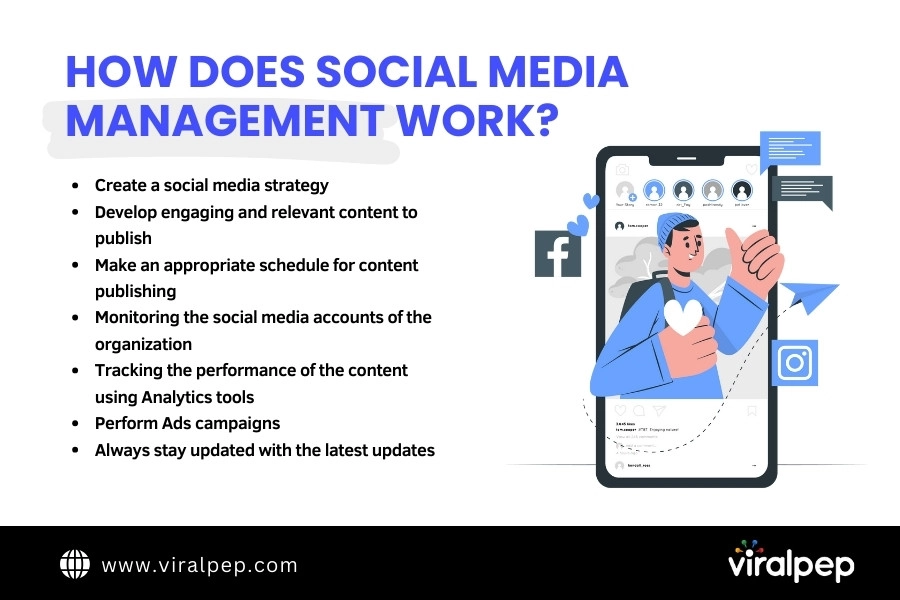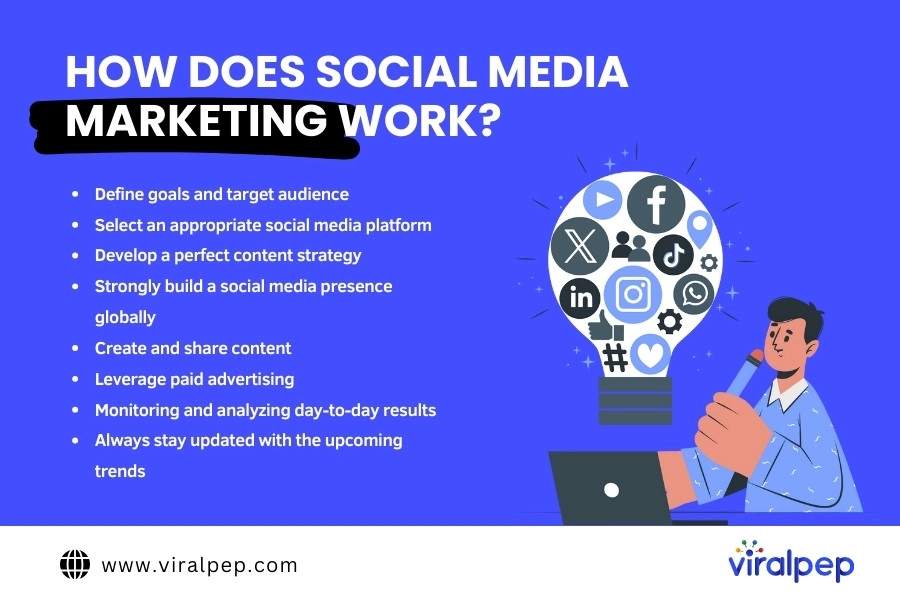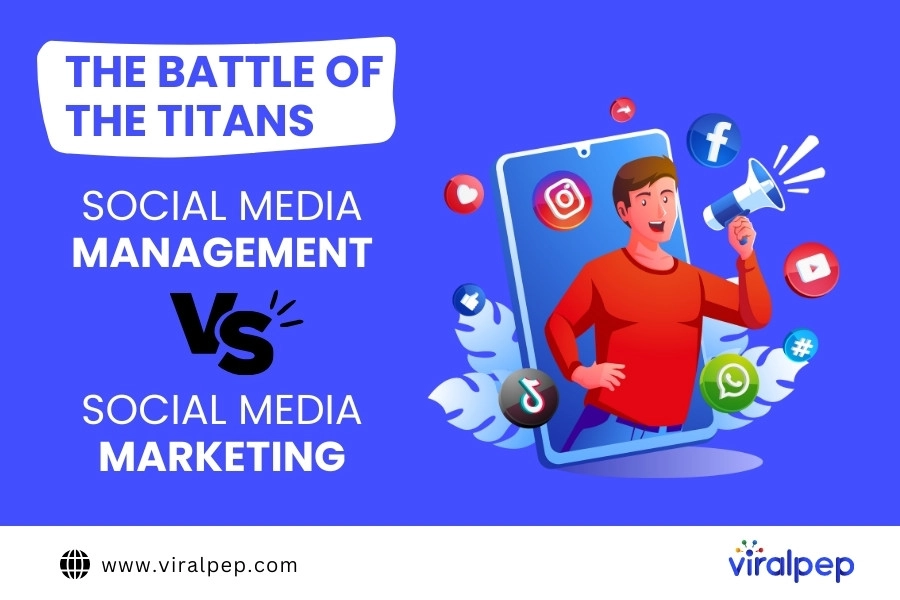Introduction
Social media marketing and social media management are two distinct but interconnected aspects of leveraging social media platforms for business purposes. While they have different focuses, both play essential roles in building a strong online presence and engaging with the target audience.
The main question: how to differentiate the two main terminologies? What are the different aspects of these two technologies? We’ve curated an article depicting the differences between social media marketing and management.
The choice between the two depends on your specific goals and resources.
What is Social Media Management?
Social media management tool for business refers to the effective oversight and control of an organization's presence on various social media platforms. The primary roles of social media management include creating, publishing, analyzing, and engaging with content on Facebook, Twitter, Instagram, LinkedIn, YouTube, and other leading social media platforms.
Social media managers or management teams help you implement a robust social media strategy and execute tactics to achieve the organization's marketing and communication objectives.
What is Social Media Marketing?
Social media management refers to overseeing and implementing an organization's social media strategy. It involves creating, publishing, and managing content on various social media platforms to engage with the target audience and achieve specific marketing goals.
In simple layperson's terms, social media marketing is a flexible process that helps you use social media platforms, especially for promoting your products, services, or brands and engaging with target audiences.
With the help of the social media marketing approach, you can easily create and share your valuable content on platforms like Facebook, Twitter, Instagram, LinkedIn, and others to attract attention, drive website traffic, and foster brand awareness.
However, it requires consistent effort, a deep understanding of the target audience, and staying up-to-date with platform trends and algorithm changes to succeed.
How Does Social Media Management Work?
Social media management is a process that includes creating, scheduling, analyzing, and engaging with content on various social media platforms to establish and maintain an organization's online presence. It encompasses planning, content creation, community management, monitoring, and reporting.

Let’s highlight the simple breakdown of how social media management typically works:
-
Strategy development
The first step is to create a social media strategy that aligns with the organization's goals and target audience. This comprises determining which platforms to use, setting objectives, and establishing a content plan.
-
Content creation
Social media managers, equipped with a social media content calendar develop engaging and relevant content to share on social media platforms. This can include text-based posts, images, videos, infographics, and links to articles or blog posts. The content is tailored to the specific platform and the target audience's preferences.
-
Scheduling and publishing
Social media management tools, including the use of a social media scheduling tool, often facilitate the scheduling of content in advance. This allows for consistent posting across platforms at optimal times when the target audience is most likely to be active. Managers may also leverage real-time posting for timely updates or news.
-
Community management
Social media managers monitor the organization's social media accounts, respond to comments, messages, and mentions, and engage with the audience. They address questions, concerns, and feedback promptly and professionally. This interaction helps build a positive brand image and fosters customer relationships.
-
Monitoring and analytics
Social media managers track the performance of their content using analytics tools provided by the platforms or third-party applications. Leveraging social media analytics tools, They analyze metrics such as reach, engagement, click-through rates, and conversions to measure the effectiveness of their social media efforts. This data helps guide future strategies and content decisions.
-
Ad campaigns and paid promotions
Social media managers may run paid advertising campaigns on platforms like Facebook, Instagram, Twitter, or LinkedIn. They create targeted ads, set budgets, monitor performance, and optimize campaigns to reach specific goals such as increasing brand awareness, driving website traffic, or generating leads.
-
Staying updated
Social media managers must stay current with the latest trends, algorithm changes, and best practices in social media marketing. They continuously research and experiment with new features, tools, and strategies to maximize their impact.
It's worth noting that a social media manager's specific tasks and responsibilities may vary depending on the organization's size, industry, and objectives. Additionally, some organizations may have dedicated teams or employ social media management agencies to handle these tasks.
How Does Social Media Marketing Work?
Social media marketing is a form of digital marketing that utilizes social media platforms to promote products, services, brands, or ideas. It involves creating and sharing content on social media platforms to engage and connect with the target audience.

Here's a general overview of how social media marketing works:
-
Set Goals and Define Target Audience
Start by identifying your marketing goals, such as increasing brand awareness, driving website traffic, generating leads, or boosting sales. Then, define your target audience to ensure your efforts are focused on reaching the right people.
-
Choose Relevant Social Media Platforms
Research and select the social media platforms that align with your target audience and marketing goals. Popular platforms include Facebook, Instagram, Twitter, LinkedIn, YouTube, Pinterest, and others.
-
Create a Content Strategy
Develop a content strategy that includes the type of content you will create (e.g., text, images, videos), the frequency of posting, and the tone and style that align with your brand. Content should be engaging, valuable, and shareable to encourage interaction and promote your brand.
-
Build a Social Media Presence
Set up profiles on the chosen social media platforms and optimize them with your brand logo, description, and relevant links. Consistency in branding, voice, and visual elements across platforms is essential.
-
Generate and Share Content
Create and share compelling content relevant to your audience and supporting your marketing goals. This can include informative articles, videos, images, infographics, polls, contests, and user-generated content. Encourage audience participation, such as comments, likes, shares, and reviews.
-
Engage with Your Audience
Actively engage with your audience by promptly responding to comments, messages, and mentions. Show appreciation for positive feedback and address concerns or complaints helpfully and professionally.
-
Leverage Paid Advertising
Consider utilizing paid advertising options on social media platforms to expand your reach and target specific demographics. Social media platforms often offer advanced targeting features that allow you to reach the most relevant audience for your business.
-
Monitor and Analyze Results
Regularly monitor and analyze the performance of your social media marketing efforts using built-in analytics or third-party tools. Track metrics such as reach, engagement, click-through rates, conversions, and ROI. Adjust your strategy based on the insights gained from the data.
-
Stay Updated and Adapt
Social media platforms are constantly evolving, so it's crucial to stay updated with new features, trends, and algorithm changes. Adapt your strategy accordingly to maximize your effectiveness on social media.
Effective social media marketing requires time, consistency, and experimentation to find what works best for your brand and audience.
Difference Between Social Media Marketing and Social Media Management
Here's a comparison table highlighting the key differences between social media marketing and social media management:
| Aspect | Social Media Marketing | Social Media Management |
|---|---|---|
| Goal | Promote products/services, generate leads | Build and maintain an online presence |
| Focus | Advertising and promotional campaigns | Engagement and relationship management |
| Strategy | Targeted content creation and distribution | Content curation and scheduling |
| Audience | Prospective and existing customers | Brand followers and existing customers |
| Key Activities | Ad campaigns, influencer partnerships | Content creation, community management |
| Metrics | Conversion rates, ROI, lead generation | Engagement rate, follower growth |
| Tools | Ad platforms (Facebook Ads, Google Ads) | Social media management platforms |
| Time Frame | Short-term campaigns | Ongoing, long-term efforts |
| Skill Set | Advertising, analytics, campaign management | Content creation, community management |
Social Media Marketing vs. Social Media Management: Which is the Best To Opt For?
Social media marketing is more focused on strategic planning, goal setting, and campaign execution with the aim of achieving specific business objectives.
Social media management is more about building and nurturing an online presence, enhancing brand image, and fostering customer engagement and loyalty.
The choice between social media marketing and social media management depends on your business goals, resources, and priorities. Here are some considerations:
- If your main objective is to drive tangible business results like lead generation and sales, social media marketing would be more suitable. It requires strategic planning, advertising budgets, and a focus on measurable outcomes.
- If you want to establish a strong online presence, build a community, and engage with your audience on social media, social media management is crucial. It emphasizes content curation, community interaction, and brand reputation management.
- In many cases, a combination of both social media marketing and social media management is necessary to achieve comprehensive and effective results. While marketing helps achieve specific business objectives, management ensures your social media presence's long-term growth and sustainability.
FAQs
What skills are required for social media marketing?
Social media marketing requires skills, including content creation and curation, copywriting, data analysis, campaign planning, advertising knowledge, social media platform expertise, and measuring and interpreting metrics. Market research, branding, and customer relationship management skills can also be beneficial.
What skills are required for social media management?
Social media management requires content creation, copywriting, community management, customer service, social media platform knowledge, scheduling and organization, analytics tracking, and basic design skills. This general process includes good communication and interpersonal skills to effectively engage with followers and respond to comments and messages.
How do social media marketing and social media management work together?
Social media marketing and social media management are closely related and often work hand in hand. Social media management handles the day-to-day activities on social media platforms, such as content creation and engagement. In contrast, social media marketing focuses on creating and implementing a broader marketing strategy, including campaign planning, advertising, and analytics. The two functions complement each other to achieve marketing goals and maintain a strong social media presence.
Can social media marketing and social media management be done by the same person or team?
Yes, social media marketing and social media management can be performed by the same person or team, especially in small businesses or organizations with limited resources. However, in larger organizations, these roles may be split between different individuals or teams to ensure effective management and execution of social media's strategic and operational aspects.
What tools are commonly used in social media marketing and management?
There are numerous tools available for social media marketing and management, including:
- Social media scheduling platforms (e.g., Hootsuite, Buffer)
- Analytics tools (e.g., Google Analytics, Sprout Social)
- Content creation tools (e.g., Canva, Adobe Creative Cloud)
- Social listening tools (e.g., Mention, Brandwatch)
- Advertising platforms (e.g., Facebook Ads Manager, Twitter Ads).
How can I measure the effectiveness of social media marketing and management efforts?
The effectiveness of social media marketing and management can be measured using various metrics, including engagement rate, reach, impressions, click-through rate, conversion rate, follower growth, customer acquisition cost, and return on investment (ROI). These metrics can be tracked through social media analytics tools and compared against predetermined goals and benchmarks to evaluate the success of the efforts.












